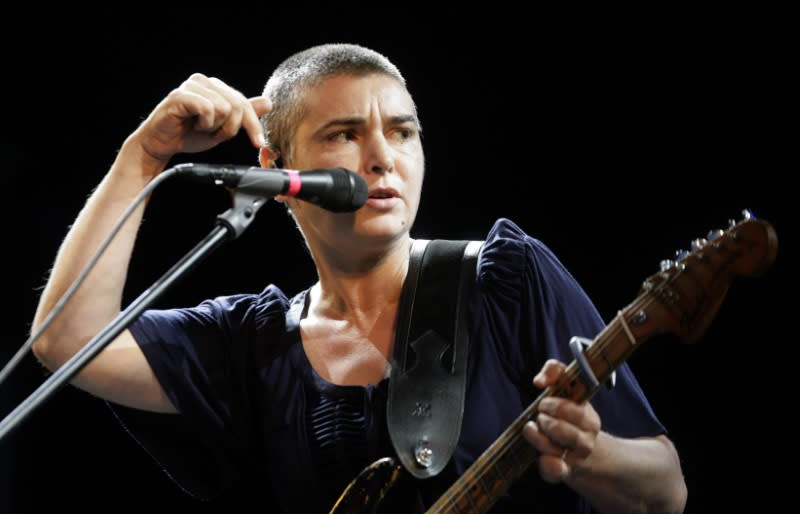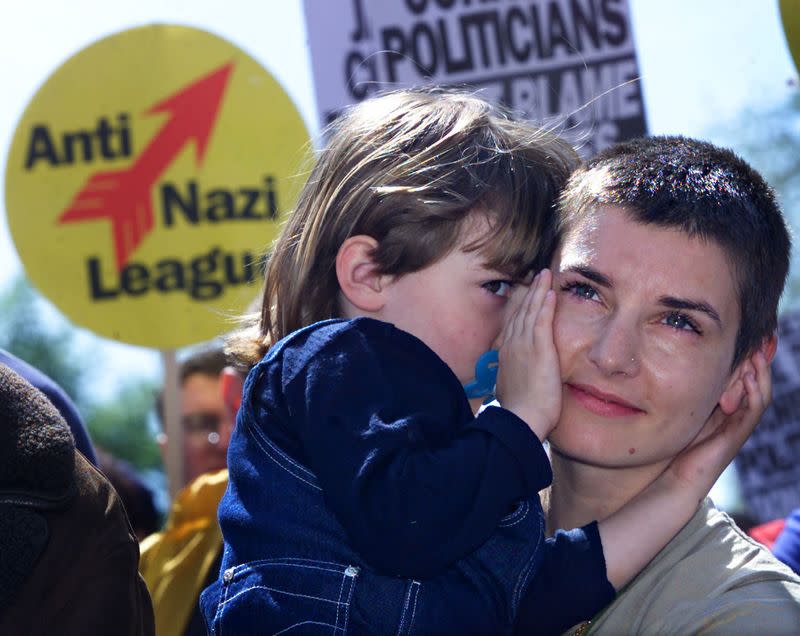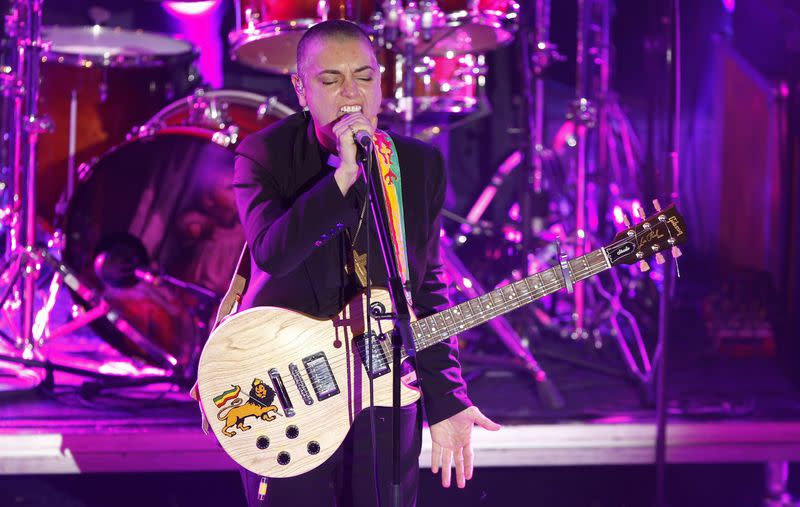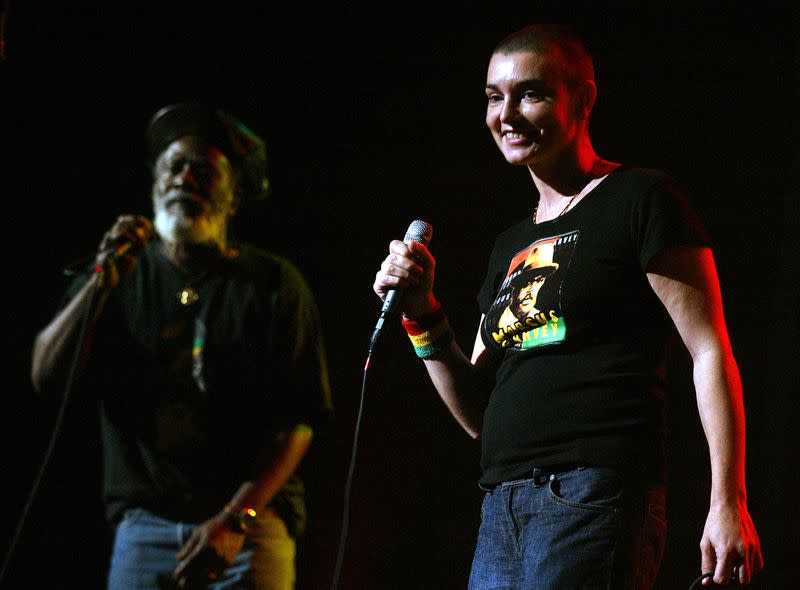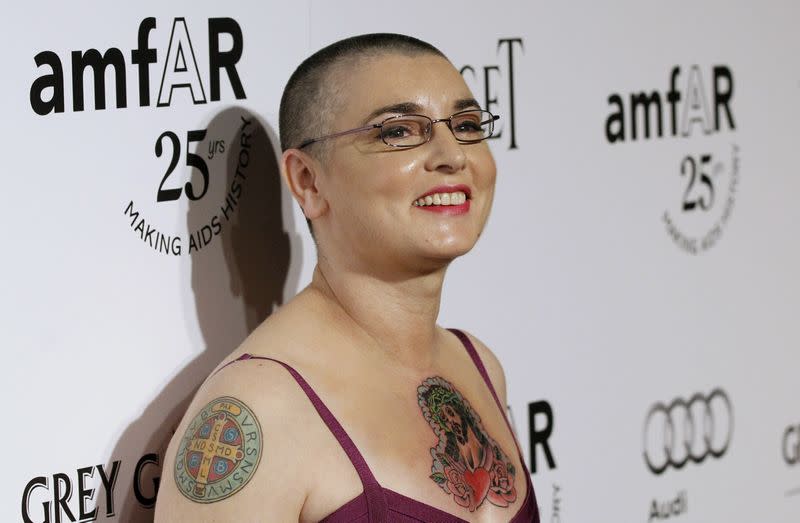Sinead O'Connor, singer of 'Nothing Compares 2 U,' dead at 56
By Graham Fahy and Padraic Halpin
DUBLIN (Reuters) -Sinead O'Connor, the Irish singer known for her stirring voice, 1990 chart-topping hit "Nothing Compares 2 U" and outspoken views, has died at the age of 56, Irish media quoted her family as saying on Wednesday.
Brash and direct - her shaved head, pained expression, and shapeless wardrobe a direct challenge to popular culture's long-prevailing notions of femininity and sexuality – O'Connor irrevocably changed the image of women in music.
"It is with great sadness that we announce the passing of our beloved Sinead. Her family and friends are devastated and have requested privacy at this very difficult time," RTE quoted a statement from the singer's family as saying.
The circumstances of her death were unclear.
O'Connor crashed onto the global music scene with her mesmerizing version of "Nothing Compares 2 U", originally written by Prince and accompanied by a music video in which she faced directly into the camera and cried.
Known as much for her outspoken views on religion, sex, feminism and war as for her music, she will be remembered in some quarters for ripping up a photo of Pope John Paul II during a 1992 television appearance on "Saturday Night Live," declaring: "Fight the real enemy".
Her criticisms of Catholicism were especially controversial in parts of Ireland but also a brave representation of a shift that was taking shape in society away from the Church, whose deep influence began to collapse later that decade over a string of clerical child sex abuse scandals.
After O'Connor's death was announced, the Irish national radio broadcaster's regular evening music show exclusively played her songs and read out tributes from listeners.
"To those of us who had the privilege of knowing her, one couldn't but always be struck by the depth of her fearless commitment to the important issues which she brought to public attention, no matter how uncomfortable those truths may have been," Irish President Michael D. Higgins said in a statement.
"What Ireland has lost at such a relatively young age is one of our greatest and most gifted composers, songwriters and performers of recent decades."
Artists including REM frontman Michael Stipe, U.S. musician Tori Amos and Irish singer Shane MacGowan paid tribute to O'Connor's fierce honesty, intense presence and uncompromising spirit.
'PROTEST SINGER'
Sinead Marie Bernadette O'Connor was born in the affluent Dublin suburb of Glenageary on December 8, 1966. In her 2021 memoir, O'Connor said her mother, who was killed in a car crash in 1985, abused her physically and mentally as a child.
She was sent to a reform school for girls but left in her mid-teens to focus on a career in music, after co-writing a song for Irish band In Tua Nua. The band's drummer had discovered her singing at his sister's wedding.
She moved to London in 1985 and after scrapping the initial tapes for her debut LP on the grounds that the production was too Celtic, she took the producer's seat herself and began re-recording the album, called "The Lion and the Cobra", which would go on to earn her a Grammy Award nomination.
However, it was track six on the follow-up album, "I Do Not Want What I Haven't Got", that catapulted O'Connor to global fame.
Prince's "Nothing Compares 2 U" first appeared on a 1985 album for his side project The Family, but he only regularly started performing the song live after O'Connor's haunting take made the song a number one hit across the world.
The record earned O'Connor four more Grammy nominations - and a win for best alternative music performance - but she shunned the ceremony in protest at the "false and destructive materialistic values" of the music industry.
Her refusal to allow "The Star-Spangled Banner" be played at any U.S. venue before she performed drew criticism from Frank Sinatra, who said she should leave the country. She was booed at a Bob Dylan tribute concert at Madison Square Garden.
O'Connor told the New York Times in a 2021 interview that the reaction to her protests against clerical sex abuse was "very traumatizing" but she never regretted it.
She released two more albums in the early 1990s and several more in the 2000s while publicly sharing her struggles with mental health illness. Her teenage son Shane, one of her four children, took his life last year.
O'Connor, who married four times, was ordained a priest in 1999 by a breakaway Catholic group and converted to Islam in 2018. She changed her name to Shuhada Sadaqat, though continued to perform under the name Sinead O'Connor.
O'Connor posted on her official Facebook account on July 12 that she had recently moved back to London, was finishing an album, and intended to tour towards the end of 2024 and early 2025.
The album, the first she had recorded in almost a decade, was ready to go, Irish radio presenter and friend Dave Fanning told Channel 4 news on Wednesday.
"Everyone wants a pop star, see?" O'Connor wrote in her 2021 memoir "Rememberings". "But I am a protest singer. I just had stuff to get off my chest. I had no desire for fame."
(Reporting by Padraic Halpin, Graham Fahy, Suban Abdulla and Amanda Ferguson, Editing by Kylie MacLellan and Rosalba O'Brien)
